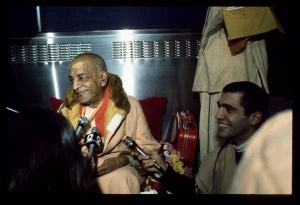CC Madhya 13.179: Difference between revisions
No edit summary |
(Vanibot #0054 edit - transform synonyms into clickable links, which search similar occurrences) |
||
| Line 17: | Line 17: | ||
<div class="synonyms"> | <div class="synonyms"> | ||
''kabhu'' | ''[//vanipedia.org/wiki/Special:VaniSearch?s=kabhu&tab=syno_o&ds=1 kabhu]'' — sometimes; ''[//vanipedia.org/wiki/Special:VaniSearch?s=sukhe&tab=syno_o&ds=1 sukhe]'' — in great happiness; ''[//vanipedia.org/wiki/Special:VaniSearch?s=nṛtya&tab=syno_o&ds=1 nṛtya]-[//vanipedia.org/wiki/Special:VaniSearch?s=raṅga&tab=syno_o&ds=1 raṅga]'' — amusement in dancing; ''[//vanipedia.org/wiki/Special:VaniSearch?s=dekhe&tab=syno_o&ds=1 dekhe]'' — sees; ''[//vanipedia.org/wiki/Special:VaniSearch?s=ratha&tab=syno_o&ds=1 ratha]'' — the car; ''[//vanipedia.org/wiki/Special:VaniSearch?s=rākhi’&tab=syno_o&ds=1 rākhi’]'' — stopping; ''[//vanipedia.org/wiki/Special:VaniSearch?s=se&tab=syno_o&ds=1 se] [//vanipedia.org/wiki/Special:VaniSearch?s=kautuka&tab=syno_o&ds=1 kautuka]'' — that amusement; ''[//vanipedia.org/wiki/Special:VaniSearch?s=ye&tab=syno_o&ds=1 ye]'' — anyone who; ''[//vanipedia.org/wiki/Special:VaniSearch?s=dekhila&tab=syno_o&ds=1 dekhila]'' — saw; ''[//vanipedia.org/wiki/Special:VaniSearch?s=sei&tab=syno_o&ds=1 sei]'' — he; ''[//vanipedia.org/wiki/Special:VaniSearch?s=tāra&tab=syno_o&ds=1 tāra]'' — of that; ''[//vanipedia.org/wiki/Special:VaniSearch?s=sākṣī&tab=syno_o&ds=1 sākṣī]'' — witness. | ||
</div> | </div> | ||
Latest revision as of 21:39, 19 February 2024

His Divine Grace
A.C. Bhaktivedanta Swami Prabhupada
A.C. Bhaktivedanta Swami Prabhupada
TEXT 179
- kabhu sukhe nṛtya-raṅga dekhe ratha rākhi’
- se kautuka ye dekhila, sei tāra sākṣī
SYNONYMS
kabhu — sometimes; sukhe — in great happiness; nṛtya-raṅga — amusement in dancing; dekhe — sees; ratha — the car; rākhi’ — stopping; se kautuka — that amusement; ye — anyone who; dekhila — saw; sei — he; tāra — of that; sākṣī — witness.
TRANSLATION
Lord Jagannātha and Lord Balarāma sometimes stopped the car and happily observed Lord Caitanya’s dancing. Anyone who was able to see Them stop and watch the dancing bore witness to Their pastimes.